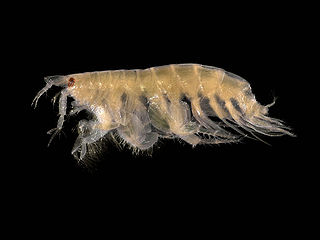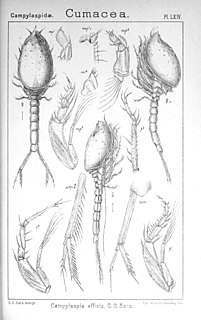
Amphipoda is an order of malacostracan crustaceans with no carapace and generally with laterally compressed bodies. Amphipods range in size from 1 to 340 millimetres and are mostly detritivores or scavengers. There are more than 9,900 amphipod species so far described. They are mostly marine animals, but are found in almost all aquatic environments. Some 1,900 species live in fresh water, and the order also includes the terrestrial sandhoppers such as Talitrus saltator.

Gammaridea is one of the suborders of the order Amphipoda, comprising small, shrimp-like crustaceans. Until recently, in a traditional classification, it encompassed about 7,275 (92%) of the 7,900 species of amphipods described by then, in approximately 1,000 genera, divided among around 125 families. That concept of Gammaridea included almost all freshwater amphipods, while most of the members still were marine.
Eophliantidae is a family of amphipods, containing the following genera:

Lysianassidae is a family of marine amphipods, containing the following genera:

Orchestia is a genus of amphipods in the family Talitridae, containing the following species:

Bathyporeia is a genus of amphipods in the family Pontoporeiidae, containing the following species:
Talorchestia is a genus of amphipod of the family Talitridae, containing the following species:

Niphargidae is a family of amphipod crustaceans. Its distribution is in western Eurasia, and its members mainly live in subterranean freshwaters habitats. It contains the following genera:

Nannastacidae is a family of crustaceans belonging to the order Cumacea. They have no free telson. The endopods of the uropods are present on one segment. There are exopods on the maxillipeds and generally one on pereopods 1–4 in males and 1–2 in females. In the females the second antenna is much shorter than the first. It contains the following genera:
Amaryllididae is a family of marine benthic amphipods found throughout the southern hemisphere. These smooth, laterally compressed amphipods can be distinguished by the accessory setal row of the mandible having a distal tuft. It contains the following genera:

Alicella gigantea is the largest species of amphipod ever observed, with some individuals reaching up to 34 centimetres (13 in) long. Formerly included in the family Lysianassidae, a new family, Alicellidae, was erected in 2008 for Alicella and five related genera. The species lives only at great depths; the first specimens were collected at the end of the 19th century from the Madeira Abyssal Plain, and subsequent specimens have been found in other abyssal plains of both the Atlantic and Pacific Oceans, as well as from the Kermadec Trench in the southwest Pacific. One specimen was found in the stomach of a black-footed albatross, but is thought to have been dead before it was eaten.

Urothoe is a genus of very small marine amphipod crustaceans in the family Urothoidae. Members of the genus are found worldwide.

Pontogeneiidae is a family of amphipod crustaceans, containing the following genera:

Alicellidae is a family of amphipod crustaceans, which live as scavengers in the deep sea, often in association with hydrothermal vents. The family includes the following genera:

Ampithoidae is a family of amphipod crustaceans. The family has a worldwide distribution as algal dwellers. They commonly create tube-shaped nests on their host plants or algae which serve as both shelter and food. Young ampithoids develop from eggs to a larval stage within their mother's brood-pouch, formed by the appendages of her abdomen.

Eurythenes is a genus of marine amphipods in the family Eurytheneidae.
Eurythenes thurstoni is a species of amphipod of the genus Eurythenes. It was first described in 2004 and named after Mike Thurston, a marine biologist specialising in deep-sea amphipods.
Aristiidae is a family of crustaceans belonging to the order Amphipoda.

Maeridae is a family of marine amphipods, which was first described by Taudl Krapp-Schickel in 2008.












